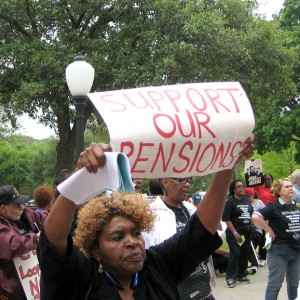TSEU Legislative Agenda 2017-2018
for more information, please contact TSEU Political Director Harrison Hiner in the Austin TSEU office (512.448.4225)
TSEU’s retirement agenda
-
Fully fund ERS’s request for $530 million above its baseline budget to make the pension fund actuarially sound
-
Allocate additional funding to allow ERS and TRS retirees to receive a COLA
-
Include Juvenile Justice Correctional Officers and Case Managers into LECOSRF
State Retirees need a Pension Increase
State retirees in ERS and TRS are in need of a long overdue increase in their pension annuities. All state retirees in the ERS system, and most in the TRS system, have not received a cost-of-living adjustment (COLA) in their monthly annuities since 2001. This has put many of state agency and university retirees in the dire situation of choosing be¬tween paying for food or paying for health care and prescriptions. The average ERS retiree receives just $1,579 per month in return for their years of dedication to public service, and more than 100,000 TRS retirees receive less than $1,000/month.
According to state law, public pension funds must be considered “actuarially sound” before paying out a pension increase. Texas state retirees were promised they would retire with dignity and economic security when they began their careers with the state. In order for the Legislature to fulfill that promise, COLA’s must be provided for both ERS and TRS retirees.
During the Interim both the ERS and TRS Boards voted to lower the expected rate of returns for both funds. ERS Lowered their expected rate of return from 8% to 7.5 % and TRS from 8% to 7.25%. What this means is that if action is not taken the ERS Fund will be depleted by 2084 and TRS will not be fully funded for 87 years. Immediate action must be taken to fulfill the states constitutional obligation to fund the pensions to actuarially sound principals.
Include Juvenile Justice Employees in LECORSF
ERS’s “Law Enforcement and Custodial Officers Supplemental Retirement Fund (LECOSRF)” was designed for state employees who deal with offenders on a daily basis. It allows staff in positions with a high rate of injury to retire after 20 years of service as long as they are over the age of 57.
JCO’s and Case Managers in the Texas Juvenile Justice Department work in a dangerous environment with the highest injury rate of all state agencies and one of the highest turnover rates. They need to be included to help reduce turnover and shorten the amount of time employees have to work in such a dangerous environment. Many TJJD staff get seriously injured before they can meet the rule of 80 and retire through the current system. They need a 20-year retirement plan for the stress and risk they have to endure working in TJJD.
.
